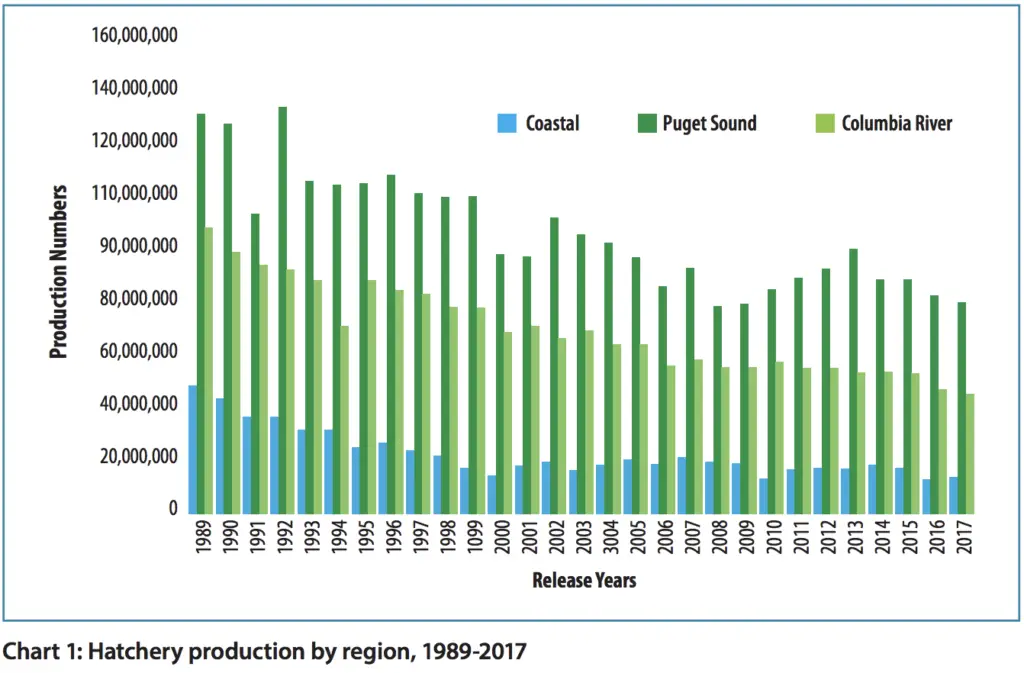
Anyone who has fished for Puget Sound salmon has no doubt heard of (or experienced) the “good old days”. We’ve all heard the many theories about what has happened to the great abundance of fish.
I just recently finished reading a fantastic book on the history of Puget Sound salmon runs that is a must read for anyone interested in what has happened to these great runs of fish that once made Puget Sound the center of all salmon fishing and more importantly to glean insights about where we are going.

Once attracting about as many participants as the combined attendance of Seattle’s three major league teams, salmon fishing was Washington’s first major league sport. In past years this state’s catch exceeded the combined sport salmon catches of California, Oregon, British Columbia and Alaska. Since then, Washington anglers often choose to travel to British Columbia or Alaska to catch salmon many of which originate in Washington!
Washington’s Sport of Kings: Views of a Fisheries Insider by Frank Haw provides a great history of fisheries management and the runs of Salmon throughout Puget Sound.
The book is a great mix of historical accounts of everything from the sizes and numbers of fish, techniques and culture as well as thoughtful reflections on his early angling experiences and what he saw led to the decline of abundance we’ve seen.
He also does a good job of projecting it forward. I had a few major takeaways from the book besides just a general appreciation, covered below:
The reasons for the decline of abundance are varied and complex, but below is my new understanding
- Habitat destruction is the primary reason why we don’t have abundant wild stocks of salmon. With Pugetropolois being one of the world’s largest clear cuts.
- Hatchery produced Salmon was the only real mitigation for the loss of habitat going back the last 60+ years.
- Extreme overfishing both recreational and commercial combined with challenging ocean conditions in the 90’s reduced stocks of Salmon significantly and led to many good changes to the commercial licensing and daily limits to promote sustainable harvest.
- The Boldt decision and ESA listing of Puget Sound Chinook reduced “opportunities” for the recreational angler in the form of quota’s and managed “impacts”, but is not the reason for the loss of abundance.
- Hatchery Science Resource Group (HSRG) introduced evidence that hatchery produced fish were impacting stocks of wild fish leading to massive cuts in hatchery production.
- Predation by the significant amounts of predators (birds, seals and sea-lions) who make Puget Sound their homes and hunting grounds.

With the Southern Resident Killer Whale (SRKW) crisis going on, we are planning to bump up hatchery production of millions of chinook smolts again, which may improve things significantly. It’s amazing though that a paper like the Seattle Times which used to sponsor salmon derbies and promote the sport are now spewing ignorant garbage against sport fishing and blaming sport fishing for the SRKW crisis.
The north migration cross nation and state boundary lines management challenge
One of the issues mentioned in the book I found fascinating was the challenge of salmon management between Washington, Canada and Alaska due to the general north migrating nature of most (some head south) salmon.
Alaska does significant commercial harvest of Canadian fish and thus Canada significantly harvests our fish.
Alaska has a vested interest in keeping their head in the sand on the issue because they want to protect their commercial fishery and tourism industry which thrives on Salmon (notably other states/nations salmon), which leaves Canada and Washington as motivated parties to figure it out, but without the needed leverage except what can only come from a federal level.
Involvement and passion for the sport of salmon angling is everything for keeping this great sport viable and healthy
“Washington’s population has doubled from 1976 to 2009 yet participation in saltwater salmon angling has decreased by two thirds”. There are a lot of people who are new to the state of Washington and to the Pacific Northwest in general. One of the primary goals of this site is to help people get into this sport which has an admittedly high learning curve.
Ideally, more involvement and passion combined with more opportunities will lead to management decisions that consider the recreational angler in a greater way. Or at least to stop the current momentum in the race towards apathy on what once was Washington’s Sport of Kings.
Checkout my primer on Puget Sound Salmon Fishing for some ideas on how to get started experiencing this great sport.